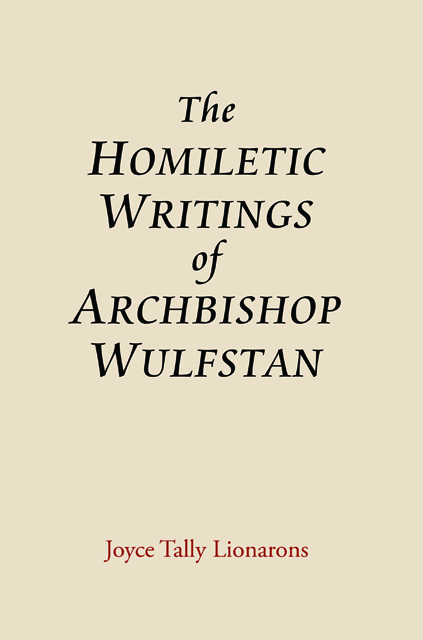Book contents
- Frontmatter
- Contents
- Acknowledgements
- Abbreviations
- Manuscript Sigla
- Introduction
- 1 Wulfstan and Wulfstan Manuscripts
- 2 Re-establishing the Wulfstanian Homiletic Canon
- 3 Wulfstan’s Eschatology
- 4 Salvation History and Christianity
- 5 Wulfstan as Archbishop
- 6 Sacramental Sermons
- 7 The Danish Invasions and the Sermo Lupi ad Anglos
- 8 Homilies Based on Legal Codes and the Institutes of Polity
- Bibliography
- Index
- Miscellaneous Endmatter
6 - Sacramental Sermons
Published online by Cambridge University Press: 18 February 2023
- Frontmatter
- Contents
- Acknowledgements
- Abbreviations
- Manuscript Sigla
- Introduction
- 1 Wulfstan and Wulfstan Manuscripts
- 2 Re-establishing the Wulfstanian Homiletic Canon
- 3 Wulfstan’s Eschatology
- 4 Salvation History and Christianity
- 5 Wulfstan as Archbishop
- 6 Sacramental Sermons
- 7 The Danish Invasions and the Sermo Lupi ad Anglos
- 8 Homilies Based on Legal Codes and the Institutes of Polity
- Bibliography
- Index
- Miscellaneous Endmatter
Summary
OF THE SACRAMENTS of the Catholic Church, Wulfstan was primarily concerned with baptism and penance. Notable for its absence is any homily pertaining to the sacrament of the eucharist: although it is possible that he composed such a sermon and it has not survived, it is likely that, given Wulfstan's characteristic emphasis on the sins of the English, he was more concerned with the sacraments involving the remission of sin: baptism, which removed the stain of original sin and provided admittance into the community of the faithful, and penance, which conferred forgiveness for sins and reconciled the penitent with both the community and the Church. Wulfstan's penitential writings, whether concerned with individual, public, or communal penance, emphasize the benefits that accrue to all Christians – both as individuals and as a community – from penitential actions. His sermons on baptism suggest that he expected priests in his dioceses to conduct both infant and adult baptisms; in addition, he uses the homilies and by implication the occasion to instruct the larger community on the importance of both the ritual and its obligations for the recipients and sponsors alike.
The early Church did not separate the sacraments of baptism and confirmation: what became confirmation in the western church grew out of the post-baptismal anointing and conferral of the sevenfold gifts of the Holy Spirit in the original Roman rite, actions that were regarded as ‘sealing’ or ‘finishing’ the sacrament of baptism and that could be performed only by a bishop. The two rites were, however, soon separated in practice: Jerome admits in Contra Luciferanos that it is ‘the custom of churches that the bishop makes excursions (excurrat) to those who, far from larger cities, have been baptized by presbyters and deacons, to lay on a hand for the calling down (ad invocationem) of the Holy Spirit’; there is also evidence of separation in southern Gaul in the fifth century and in Germany and elsewhere in the eighth century. It was clearly impossible for bishops to travel to remote areas of their dioceses to attend every baptism, even (or especially) if, following Roman practice, the sacrament was given only at the Easter vigil, although with the development of the doctrine of original sin and the concomitant emphasis on infant baptism, this practice quickly changed to baptism quamprimum (‘as soon as possible’).
- Type
- Chapter
- Information
- The Homiletic Writings of Archbishop WulfstanA Critical Study, pp. 123 - 146Publisher: Boydell & BrewerPrint publication year: 2010

